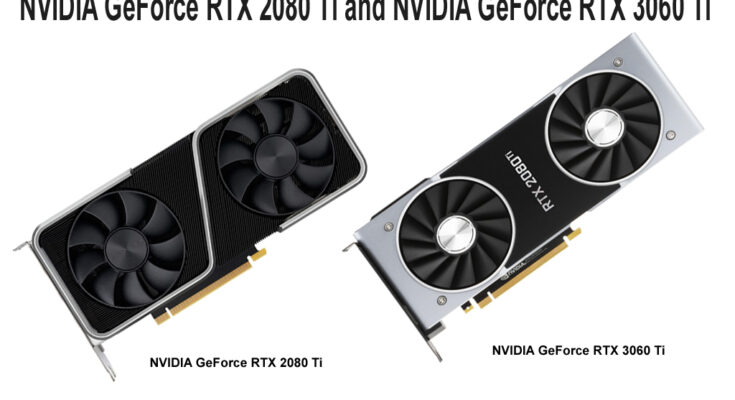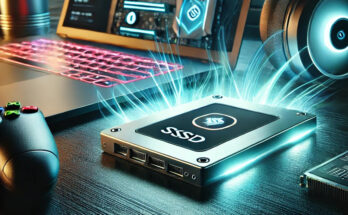The NVIDIA GeForce RTX 2080 Ti and the NVIDIA GeForce RTX 3060 Ti are two high-end graphics cards from NVIDIA that have both made a big impact on the gaming community. In this article, we will take an in-depth look at both of these cards and compare their features and performance.
Here is a comparison table between the NVIDIA GeForce RTX 2080 Ti and the NVIDIA GeForce RTX 3060 Ti:
| Specification | RTX 2080 Ti | RTX 3060 Ti |
| Release date | 2018 | 2020 |
| Architecture | Turing | Ampere |
| CUDA cores | 4352 | 4864 |
| Memory | 11GB GDDR6 | 8GB GDDR6 |
| Memory bandwidth | 616 GB/s | 448 GB/s |
| Boost clock speed | 1635 MHz | 1665 MHz |
| Power consumption | 250W | 200W |
| Price | $1199 | $399 |
As you can see, the RTX 2080 Ti has more CUDA cores and higher memory bandwidth, which allows it to perform better than the RTX 3060 Ti in some scenarios. However, the RTX 3060 Ti is based on a newer and more efficient architecture, which allows it to deliver similar performance while consuming less power. The RTX 3060 Ti also has a lower price point, making it a better value for money option for gamers and enthusiasts on a budget.
Architecture and Manufacturing Process
The RTX 2080 Ti is based on the Turing architecture and was released in 2018. The card is manufactured on a 12nm process and has a total of 18.6 billion transistors. The RTX 3060 Ti, on the other hand, is based on the newer Ampere architecture and was released in 2020. The card is manufactured on a 8nm process and has a total of 17.4 billion transistors.
The Ampere architecture provides significant improvements in terms of power efficiency and performance per watt. The RTX 3060 Ti has a higher number of CUDA cores and more powerful RT cores and Tensor cores, making it more efficient and faster than the RTX 2080 Ti.
CUDA Cores
The RTX 2080 Ti has 4352 CUDA cores, while the RTX 3060 Ti has 4864 CUDA cores. This makes the RTX 3060 Ti more powerful in terms of raw performance. The higher number of CUDA cores means that the RTX 3060 Ti can handle more complex calculations and processes, resulting in better performance in games and other applications.
Memory RTX 2080 Ti & RTX 3060 Ti
The RTX 2080 Ti has 11GB of GDDR6 memory with a bandwidth of 616 GB/s, while the RTX 3060 Ti has 8GB of GDDR6 memory with a bandwidth of 448 GB/s. Although the RTX 2080 Ti has more memory, the difference in performance is negligible in most applications.
Power Consumption
The RTX 2080 Ti has a power consumption of 250W, while the RTX 3060 Ti has a power consumption of 200W. This is a significant improvement in power efficiency, which is a result of the newer Ampere architecture and the smaller 8nm manufacturing process.
Price
The RTX 2080 Ti was launched with a price tag of $1199, while the RTX 3060 Ti has a much more affordable price tag of $399. The RTX 3060 Ti provides an excellent value for money option for gamers and enthusiasts who are looking for high-end graphics performance at a more reasonable price point.
Performance Comparison
In terms of raw performance, the RTX 3060 Ti is very close to the RTX 2080 Ti. Both cards can deliver excellent performance in games and other applications. However, the RTX 3060 Ti is more power-efficient and provides better value for money.
In games like Cyberpunk 2077, the RTX 3060 Ti delivers a consistent 60fps at 1080p and 1440p resolutions. The RTX 2080 Ti, on the other hand, provides a slightly better performance of 64fps at 1080p and 74fps at 1440p resolutions. In 4K gaming, the RTX 2080 Ti provides a better experience, with the RTX 3060 Ti struggling to keep up.
Conclusion
Both the NVIDIA GeForce RTX 2080 Ti and the NVIDIA GeForce RTX 3060 Ti are excellent graphics cards, but the RTX 3060 Ti provides better value for money. It has a higher number of CUDA cores, better power efficiency, and a much more affordable price tag. The RTX 2080 Ti, on the other hand, is a more powerful card, but the difference in performance is not significant enough




